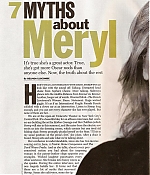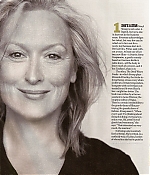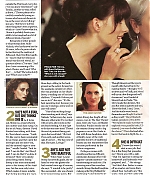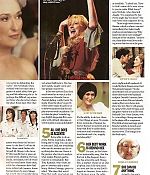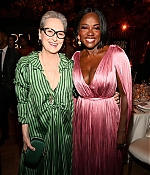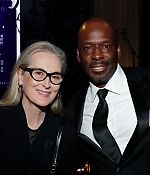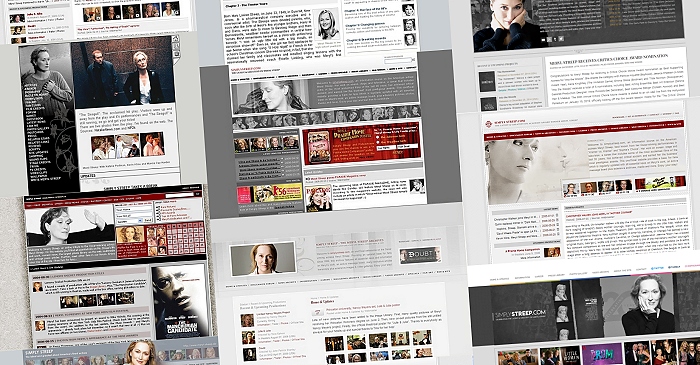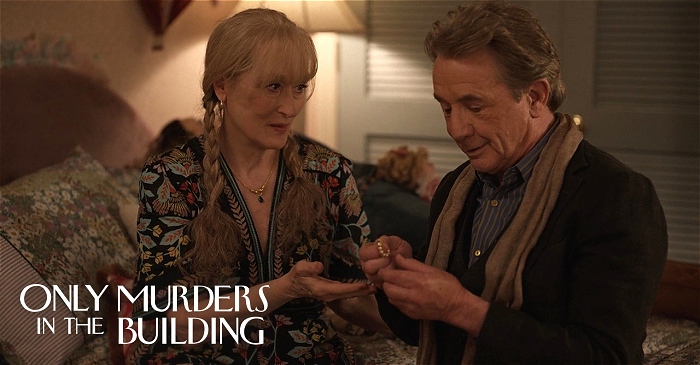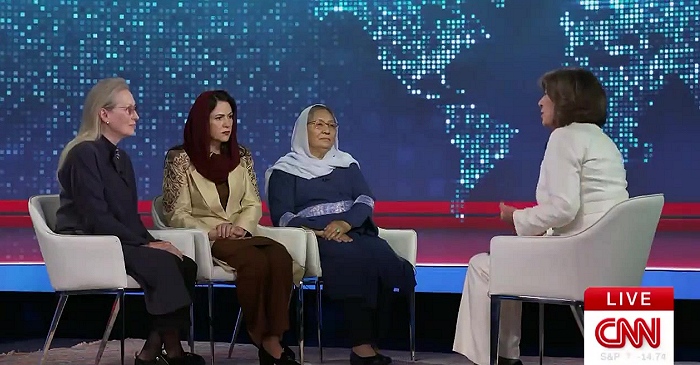
|
7 Myths About Meryl
Time Magazine ·
June 19, 2006
· Written by Belinda Luscombe
|
It’s true she’s a great actor. True, she’s got more Oscar nods than anyone else. Now, the truth about the rest Here’s what a conversation with Meryl Streep would look like with the sound off: Talking. Distracted head shake from Sophie’s Choice. More talking. Sideways glance into the middle distance from Kramer vs. Kramer. Another, longer set of words. Wearied blink-The French Lieutenant’s Woman. Pause. Statement. Huge wicked giggle. It’s as if an International Fragile Female Parade collided with a clown car at an intersection. Listen to Streep long enough, and you can see every character she has ever played. But none of them are her. We are at the open-air Delacorte Theater in New York City’s Central Park. It’s a beautiful day for an alfresco interview, but workers are building the set for Mother Courage and Her Children (which Streep will star in this summer), and the noise from the electric saw sends us into the dressing rooms, which contain but one tired old folding chair. Streep promptly plunks herself on the floor. “I’ll sit in my usual position-at the press’s feet,” she jokes. After a chair is found, Streep sits and asks what we’re talking about. Her confusion is understandable, since she has two movies coming out in June, A Prairie Home Companion and The Devil Wears Prada. And as she talks, almost every preconceived notion you had about the imposing woman in the patent-leather clogs opposite you crumples. Wicked laughter punctuates every other sentence. She breaks into funny voices as she speaks. During the entire interview, not one tragedy befalls her. It turns out that there are a lot of myths that surround Streep. Some she cultivates, some she ignores. Here are seven of them …
1 SHE’S A STAR
Meryl Streep is not a star. A legend, but not a star. At least not in the business sense. Everyone acknowledges her talent, but very few can be relied on to turn out for a movie just because she’s in it. Her last film, Prime, sank without a trace. At least one of her two new films-A Prairie Home Companion, a gentle comedy based on Garrison Keillor’s radio show-will be lucky to draw much of a crowd-and it has Lindsay Lohan in it. The other, The Devil Wears Prada-in which Streep plays Miranda Priestley, the titular infernal being, whose every whim (coffee at a certain temperature, bouquets with no freesias) is attended to as if it were Shari’a law-might fare better. The book was written by a former assistant to Anna Wintour, the longtime editor of Vogue. There’s a certain irresistibility to the grande dame of film portraying the grande dame of fashion. Streep sees it. “Whenever I said, ‘I’m thinking about doing this thing,’ everyone’s reaction was, Oh, yesss! Sort of gleeful and venomous,” she says. “That interested me very much, the reaction.” Not being a star is entirely fine by Streep. She’s critical, in a motherly way, of Lohan, hordes of whose fans she had to push by outside the Prairie set every day. (“Do you know who this is?” Lily Tomlin, another co-star, yelled at them.) “There’s plenty of incredibly wonderful young actresses who have not chosen to be on the cover of everything,” she says. “But they’re not this other thing that’s seen at parties, which is-I don’t know what it is. I know it probably limits your ability to be imagined as a lot of different kinds of people.” Being lots of other people is what Streep does. Mike Nichols, who has known her for 25 years, tells of a panic attack he had during the making of Silkwood, their first film together. “I knew that the Silkwood Meryl was the real Meryl, no question about it,” he says. “And then I saw a screening of Sophie’s Choice, and I said, ‘Who the f___ is that? She’s absolutely real! Which one is she?!'”
2 SHE’S NOT A STAR, BUT SHE THINKS SHE IS
As it turns out, Streep is a cross between den mother and class cutup. On the set of Prada, director David Frankel was talking with Stanley Tucci about a scene. “I said, ‘It’s like you’ve been nominated for an Oscar, and they open the envelope and you don’t win, and the camera’s right in your face,'” recalls Frankel. “And he said, ‘I can do that.’ And Meryl said, ‘I can do that! I’ve done it 11 times!!’ She’s very playful about being Meryl Streep.” Streep is the most nominated actor in the history of the Academy, but has won only twice. Which makes it more notable that during shooting she essentially worked as an extra for three days, sitting in the background as the action focused on the assistants outside her office. She was probably on her BlackBerry, e-mailing one of her four children. “Gwyneth Paltrow put me on to it,” she says. “It’s the best parenting tool, because you can use it during a scene and no one will notice.” “One of the striking things about working with Meryl,” says Nichols, “is that every day, more than any other actor I’ve worked with or seen, she comes on the set clearly feeling, ‘Oh boy I get to do this one more time!’ There’s this sort of pretend-being-put-upon that we all start: ‘Oh God, it’s so early, and another scene, ugh, it’s so hot …’ She has none of that. She’s just, ‘Let’s go!'”
3 SHE’S JUST NOT THAT BEAUTIFUL
When Mary Louise Streep hit seventh grade, she refused to wear the glasses she had needed since age 4 because, she says, “I wanted to be pretty.” She succeeded-she was chosen to be homecoming queen. But being unattractive is an accusation Streep has fought all her career, even in The Deer Hunter days, when she was a certifiable knockout. Frankel thinks one of the reasons Streep made a big popcorny movie like Prada is that with three daughters, she’s critically aware of the well-patrolled borders of traditional beauty and the Minutemen-like function performed by the fashion magazines. Perhaps a woman with cheekbones like ice cliffs gets called plain because of her willingness-almost insistence-on transforming for each role. (On receiving one of her countless awards, Streep thanked longtime makeup artist Roy Helland for continuing “to do his best to destroy my natural good looks.”) Though Streep’s not the type to meekly offer herself up to the makeup trailer. “I thought, We’ll sit down and we’ll talk, and Meryl will try on a few things and we’ll choose one,” says Frankel of Streep’s look in Prada. “No. Meryl made the decision. She and Roy sent us a photo and said, ‘Here’s the look.’ I said, ‘Great.’ And the studio were beside themselves and fought it as hard as they could.” (Says Elizabeth Gabler, president of Fox 2000: “We wanted to make sure that we explored every possible look. [Ultimately], we were thrilled with the choice.”) This is the kind of behavior that leads to Myth No. 4 …
4 SHE IS DIFFICULT
“I know that when I start a new job, that this is the thing that precedes me,” Streep says with a sigh. “That I’m rigorous in doing my homework and hideously overprepared, and …” She shrugs. “And that’s fine. Better to come off as smarter and more disciplined than I actually am.” She waits a beat and then adds with a delighted laugh, “Not that I’m interested in debunking the myth!” Yet everybody who’s worked with her turns into a geyser of mush about how giving and life-affirming she is. So perhaps the difficult rep arises not from who she is but whom she plays these days. Her characters went from frail to ferocious. In the first 15 of her 44 films, those made before she turned 40, Streep (who turns 57 this month) lost or gave up at least seven children, five husbands, one fiance, her life twice and her mind once. Since then, while her characters have had some rotten luck (cancer, house burned down by son), Streep has mostly played people taking charge of their own destiny, if not actual ballbusters. She has shot rapids, taught violin and had people murdered. In her two newest films she’s much more fun to watch as the carnivorous Miranda than as Prairie’s fading, wistful rustic Yolanda. Does the sheer longevity of her career make it hard for us to believe anymore that she can play anyone weak or pathetic? Or is it that she plays Yolanda’s aging, slightly desperate flirt, complete with old-lady cleavage, so well it makes us uncomfortable?
5 ALL SHE DOES IS ACCENTS
Being able to do accents, Streep maintains, is like being able to sing. You can do it or you can’t. Still, not everybody who can do accents can do everything else she can. Brave is the person who tries to analyze what makes Streep’s performances so remarkable. But Tony Kushner, who wrote Angels in America and is translating Mother Courage, gives it a whirl. “She does that weird thing that really great actors can do that really good actors can’t. It’s the ability to do two, three or four things at once. To create these moments of human behavior that are so layered and so deep that they’re ambivalent: confusion and contradiction, heartbreak and a lie, tragedy and absurdity.”
6 HER BEST WORK IS BEHIND HER
It’s true, as Rod Stewart so memorably sang, that the first cut is the deepest. Everyone has a favorite early Streep film, a Sophie’s Choice or an Out of Africa. But if the first piece you ever saw her in was 2003’s Angels in America, those roles-the Mormon mom, the rabbi, Ethel Rosenberg-would be just as indelible. “I asked her, ‘How in God’s name did it ever occur to you to make Ethel funny?’ says Nichols, who directed Angels. “I’m surprised by her every single day we shoot.” She may have more surprises for us. Those might soon come in theater, which is where, raw and unmediated, her talent really reaches out and slaps you. Why hasn’t she done more onstage? Because of her children. “Believe me, these kids would love nothing more than for me to be gone every night and all weekend. It would be their dream come true! Not going to happen.” So she does theater only in summer. Her three older kids with husband sculptor Donald Gummer, however, are in their 20s and already making their own forays into show biz. Son Henry will appear in Lying with Chloe Sevigny, and daughter Mamie is in a film with Richard Gere. Once Louisa, now 14, is in college, Streep can take to the stage with a vengeance. Four kids, a long marriage, great beauty, bushels of awards and some of the best movie performances ever. This brings us to the final myth.
7 SHE CAN DO ANYTHING
Actually, that one’s probably true.

